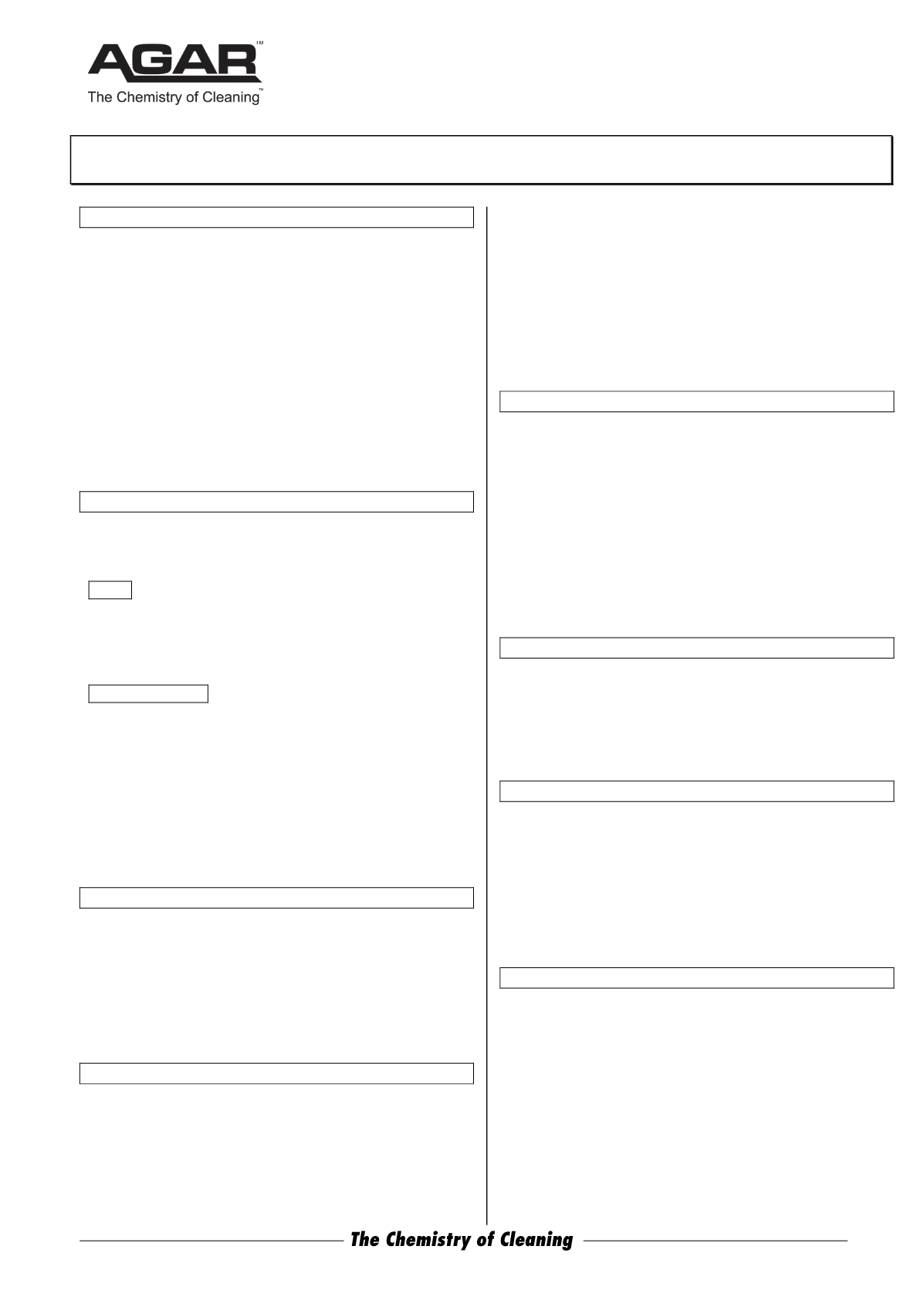

ABN 80 004 726 890 | MADE IN AUSTRALIA
VIC 03 9480 3000
NSW 02 9743 6020
SA 08 8293 2020
QLD 07 3274 3438
WA 08 9249 4566
Safety Data Sheet
Issued: December 18, 2015
Page 1 of 2
SOFTIE
1 IDENTIFICATION OF THE MATERIAL AND SUPPLIER
Product Name:
SOFTIE CREAM CLEANSER
Other Names: -
Manufacturer's Product Code: SOF500, SOF5, SOF20
Product Use: Cleaner and sanitiser for hard surfaces.
COMPANY DETAILS
Company: Agar Cleaning Systems Pty. Ltd.
Address: 12-14 Cope Street, Preston, Vic. 3072
Telephone: 03 9480 3000 Facsimile: 03 9480 5100
Web:
www.agar.com.auAgar SDS are available from this website.
E-mail:
admin@agar.com.auEmergency Telephone Number: 131 126
(Aust wide)
2 HAZARDS IDENTIFICATION
Hazardous according to criteria of Safe Work Australia.
Irritant Xi. Not classed as Dangerous Goods.
Risks:
Contact with acid liberates toxic gas. [R31]
Irritating to skin. [R38]
Risk of serious damage to eyes. [R41]
Safety Directions:
Keep out of the reach of children. [S2]
In case of contact with eyes, rinse immediately
with plenty of water and seek medical advice. [S26]
Wear suitable gloves and eye/face protection. [S37/39]
In case of accident or if you feel unwell, seek
medical advice immediately (show the label
whenever possible). [S45]
Softie becomes non-hazardous at concentrations below 77%.
3 COMPOSITION / INFORMATION ON INGREDIENTS
Ingredients:
Chemical Entity: CAS No.: Proportion:
Calcium compounds non-haz
10 - < 30%
Sodium hypochlorite 7681-52-9
< 10%
Sodium hydroxide
1310-73-2
< 2%
Surfactants
non-haz
< 10%
Water and 7732-18-5
other non-hazardous ingredients
to 100%
4 FIRST AID MEASURES
Poisons Information Centre: Phone 131 126
Swallowed:
If poisoning occurs, contact a doctor or Poisons
Information Centre. If swallowed give two glasses of water to
drink. Rinse mouth with water. Never give anything by mouth
to an unconscious person.
Eye:
Immediately hold the eyes open and wash continuously
for at least 15 minutes with fresh running water. Ensure
irrigation under eyelids by occasionally lifting the upper and
lower lids. Removal of contact lenses after an eye injury
should only be undertaken by skilled personnel. Seek medical
attention if irritation persists.
Skin:
Remove any contaminated clothing and flush area with
water and soap. Seek medical attention in the event of
irritation.
Inhaled:
If any effects are observed, remove affected person to
fresh air. Lay patient down. Keep warm and rested. If
breathing is shallow or has stopped, ensure clear airway and
apply resuscitation. Call a doctor.
5 FIRE FIGHTING MEASURES
Fire/Explosion Hazard: Softie is not combustible.
Fire Extinguishing media: Water spray or fog. Foam. Dry
chemical powder. Carbon dioxide.
Fire Fighting PPE: Wear breathing apparatus and full protective
gear: gloves, boots, mask and overalls.
Special fire-fighting procedures: None.
Unusual fire hazards: None.
Hazardous products of combustion: Thermal decomposition at
temperatures above 200 deg C or in a large fire may yield
toxic fumes which cause severe eye, nose, throat and lung
irritation. Use adequate ventilation.
6 ACCIDENTAL RELEASE MEASURES
Do not touch or walk through spilled material. Clean up all spills
immediately. Spills may be slippery. Avoid contact with skin and
eyes. Contain spill and mop up. Place in a suitable, labelled
container for waste disposal.
If spilled on clothing, remove and launder before re-use.
7 HANDLING AND STORAGE
Storage and Transport: Store in a cool, dry place that is well
ventilated and away from foodstuff containers. Keep
containers closed at all times. Keep out of reach of children.
Incompatibility (Materials to avoid for purposes of transport,
handling and storage only): Not to be loaded with Class 4.3,
Class 5 or foodstuffs. Do not store in aluminium or galvanised
containers. Store away from acids.
8 EXPOSURE CONTROLS / PERSONAL PROTECTION
Exposure Standards: None assigned for mixture. Data for
principal ingredients only:
Product contains less than 1% available chlorine. Risk of
atmospheric contamination by chlorine is considered
minimal as long as no other chemicals are added to the
product.
Atmospheric Contaminant Exposure Standard for:
Chlorine CAS No. 7782-50-5
TWA = 1ppm (3mg/cu.m.) Peak limitation
STEL = -
[Source: Safe Work Australia HSIS 2015]
Please turn to Page 2


















